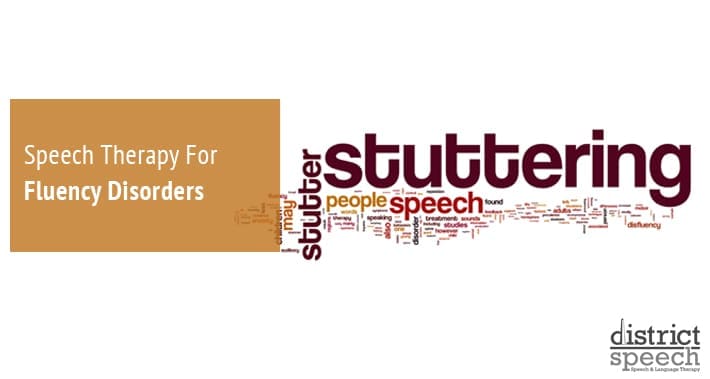
Whether you’re an adult or a child, speech fluency disorders can feel isolating.
Being unable to speak in the same way as your peers is challenging and can have effects on self esteem.
If you have a speech fluency disorder, you may be looking for speech therapy to help you with your fluency.
What Is Fluency In Speech?
Fluency is the smoothness, rate, continuity, and effort in your speech.
Everyone who speaks isn’t completely fluent at all times.
People commonly stutter, use filler words like “um” or “uh”, and repeat words.
All of those are examples of disfluency.
What Is A Fluency Disorder?
A fluency disorder, however, is a little bit more than just the disfluencies that most people experience.
If you have a fluency disorder, you likely experience an interruption in the flow of your speech.
This might look like problems with your speech rate, rhythm, disfluencies, and might also include excessive tension, speaking avoidance, and other mannerisms.
There are two common kinds of fluency disorders, stuttering and cluttering.
Stuttering
Stuttering is the most common fluency disorder.
It occurs when you experience a disruption in your speech flow.
Stuttering is also related to psychological, emotional, social and functional consequences like social anxiety, negative thoughts and feelings about communication, and a sense of loss of control.
Stuttering Symptoms
If you experience stuttering, your symptoms might include:
-
- repeating sounds, syllables, and short words
- unintentionally lengthening consonants
- blocks that prevent you from initiating sounds or cause silent fixation
What Causes Stuttering?
Usually, stuttering originates in childhood by the age of 4.
Genetics likely play a role in stuttering, as does brain development and structure.
Boys are at a higher risk of stuttering than girls, but anyone can be at risk for developing a stutter if there is a family history of stuttering, if stuttering starts later than 3.5 years, and if you have slower rates of language development or a speech impairment.
Stuttering can either start progressively or suddenly, and can also appear, disappear, and then reappear.
Stuttering can be experienced along with other disorders like ADHD, autism, learning or intellectual disabilities, seizure disorders, social anxiety disorder, and other developmental disorders.
How Can Speech Therapy Help?
Stuttering is something many speech therapists are very familiar with treating.
There are many techniques speech therapists can use, but the most important thing to know is that treatment is tailored to what you need based on a thorough assessment.
Typically, treatment for stuttering is focused on increasing effective communication and acceptance with stuttering.
Clients who receive speech therapy for stuttering usually report that speech therapy increases their confidence and self efficacy.
Cluttering
Cluttering causes breakdowns in speech clarity and fluency because of a rapid, irregular speech rate.
It can occur with stuttering or on its own.
Cluttering Symptoms
If you experience cluttering, your symptoms might include:
-
-
- Pausing in sentences where you shouldn’t pause
- Deleting or collapsing syllables
- Experiencing an excessive amount of typical disfluencies
- Omitting the ending of words
- Frequent topic shifting
-
What Causes Cluttering?
There isn’t much information yet about the causes of cluttering.
Some research indicates it might be genetic.
There are also indicators that it’s related to neurological factors or self regulation factors.
We do know that cluttering is more common in males and there is some evidence that a family history of cluttering means you’re more likely to experience it.
There are also some disorders that often co-occur with cluttering, like autism, Tourette’s syndrome, and ADHD.
How Can Speech Therapy Help?
When you see a speech therapist for cluttering, one of the main things they’ll do is help you slow down your speech.
Otherwise, treatments for cluttering tend to be similar to treatments for stuttering.
Either way, your speech therapist will tailor your treatment to your specific needs.

What’s The Difference Between Stuttering Vs Cluttering?
There are a few key differences that can help you tell stuttering and cluttering apart.
If you stutter, you’re likely to have more trouble speaking when you’re under stress than someone who clutters.
People who clutter don’t typically have trouble speaking in longer sentences, although people who stutter often do.
If you stutter, you’re probably aware of your difficulties with fluency.
Someone who clutters, however, is probably not aware of their fluency problems.
Finally, if you clutter, you can probably sight read new texts fluently.
However, if you stutter, you may have a lot of difficulty with this due to fear and anxiety related to speech.
What Do Stuttering And Cluttering Have In Common?
There are also a lot of traits that stuttering and cluttering share, which is why sometimes the treatment for each is very similar.
For example, they’re both fluency disorders that can cause repeated syllables, phrases, and words.
People with cluttering or stuttering will also often find themselves stopping in the middle of sentences to rephrase, pausing during speech when they don’t want to, and accidentally leaving words unfinished.
Can You Have Stuttering And Cluttering At The Same Time?
If you have a stutter, it’s also very likely that you experience cluttering, even if you don’t realize it.
Usually, cluttering is found in conjunction with stuttering.
People who experience both stuttering and cluttering together are also likely to experience difficulties with reading, narrating stories, finding the right words when speaking, below average memory abilities.
Book Your Appointment With District Speech Today
If you experience stuttering or cluttering, an experienced speech therapist can help you take your confidence back and take charge of the way you speak.
If this is something you need, book your appointment with District Speech today.
1300 I St NW, #400E,
Washington, DC 20005
- https://g.page/districtspeech
District Speech and Language Therapy specializes in speech therapy, physical therapy, and occupational therapy solutions, for both children and adults, in the Washington D.C and the Arlington Virginia areas.